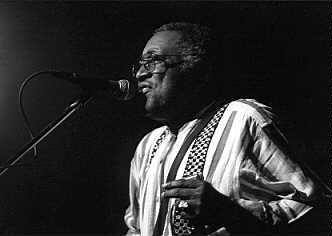




 The Blues Saloon, 3/28/98 Photo © 1998 by Tom Asp. All rights reserved. |
Eddie Burks is one of these travelers with that optimistic spirit. Perhaps less know than some of his contemporaries but still the "real deal" (in the words of photographer Tom Asp). This was traditional Chicago blues harmonica blown by one of the veterans of the Chicago scene. He opened the 9:30 PM show with a "good afternoon ladies and gentlemen," that brought a few chuckles from the audience and set the tone for a fun evening of down home and back alley Chicago blues. He also had his bags and suit case right up there on stage - packed and ready to hit the road again after another one night stand.
 The Blues Saloon, 3/28/98 Photo © 1998 by Ray Stiles All rights reserved |
 The Blues Saloon, 3/28/98 Photo © 1998 by Tom Asp. All rights reserved. |
Eddie Burks was born in Greenwood Mississippi, September 17, 1931 on a plantation called Rising Sun. He was the youngest of 13 children in a poor sharecropping family.
When asked how long he has been playing the harmonica Burks said "I have been playing the harmonica all my life. Ever since I can remember, 'cause my dad used to buy me a harmonica every year for Christmas." I jokingly asked if he got them in a different key each year and he said "No, he bought me the same harmonica EVERY year. He bought me a C harmonica. That's why I very seldom play in that key, because it was the only key I played in up until I got to be a great big boy and I was able to buy them myself."
Burks moved to Chicago in 1946 and tried to hang out where the musicians were playing the harmonica but was too young most of the time. "I was so little they wouldn't let me in the places. I went to a place where John Lee (Williamson) was playing on 31st and Indiana. This cat let me sit down and I bought a half pint of Sunny Brook and you pay 50 cents for a set up.
 Photo © 1998 by Ray Stiles All rights reserved |
Eddie learned to sing gospel during the 1950's. He belonged to the same church as Sam Cooke and Mahalia Jackson, The Greater Harvest Baptist Church on South State Street. It was under the tutelage of Robert Anderson & Willie Webb (the same men who tutored Sam Cooke) that he learned how to really sing and develop his voice.
 Photo © 1998 by Ray Stiles All rights reserved |
Eddie worked in the steel mills while he raised his family and spent many years as a sideman for Jimmy Dawkins and Eddie Shaw. He raised his family and eventually quit the steel mill to pursue music full time. In 1990, he established his own band and recorded the first of 3 self produced CDs. The "Vampire Woman" hit the Living Blues charts at #15 in 1991. "This Old Road" (1992) stayed on the charts for several months, peaking at #2. And "Comin' Home" (1994) reached #11 on the Living Blues charts.
I asked him about Jimmie Lee Robinson, a Chicago guitar and bass player who played with Elmore James and Little Walter in the 1950's (see review in July 1997 TCBN). Eddie said "Jimmie Lee is a smart guitar player. Don't let nobody tell you he don't know HOW to play with a harp blower. He played with Little Walter when he was nothin' but a kid. I remember when Little Walter was teaching him. Little Walter used to hang out at the park down on Roosevelt Road & Sacramento. That was his park that he hung out at all day long, and he was teachin' his musicians how to play behind a harp blower. They didn't have bass then, like they do now. Musicians didn't have the money they got now. So they used to take a guitar and tune it down. They used to tune a guitar a different way to play with a harp blower not like what they do now. So that's why a harp blower now days (has) a little trouble because the guitar player doesn't know how to really play with him."
 The Blues Saloon, 3/28/98 Photo © 1998 by Tom Asp. All rights reserved. |
After the show Eddie Burks was back on his own "blues highway" heading to another show in another town, just trying to keep that spirit alive.
To order the Eddie Burks' CD's visit his web page at: http://members.aol.com/rsgsonblue
Or E-mail: Rsgsonblue@aol.com

Table of Contents:
Copyright © 1998 by Ray M. Stiles
Home Page |


All rights reserved. No part of this publication may be reproduced or transmitted in any form or by any means, electronic or mechanical, including photocopy, or any information storage or retrieval system, without permission in writing from the author.